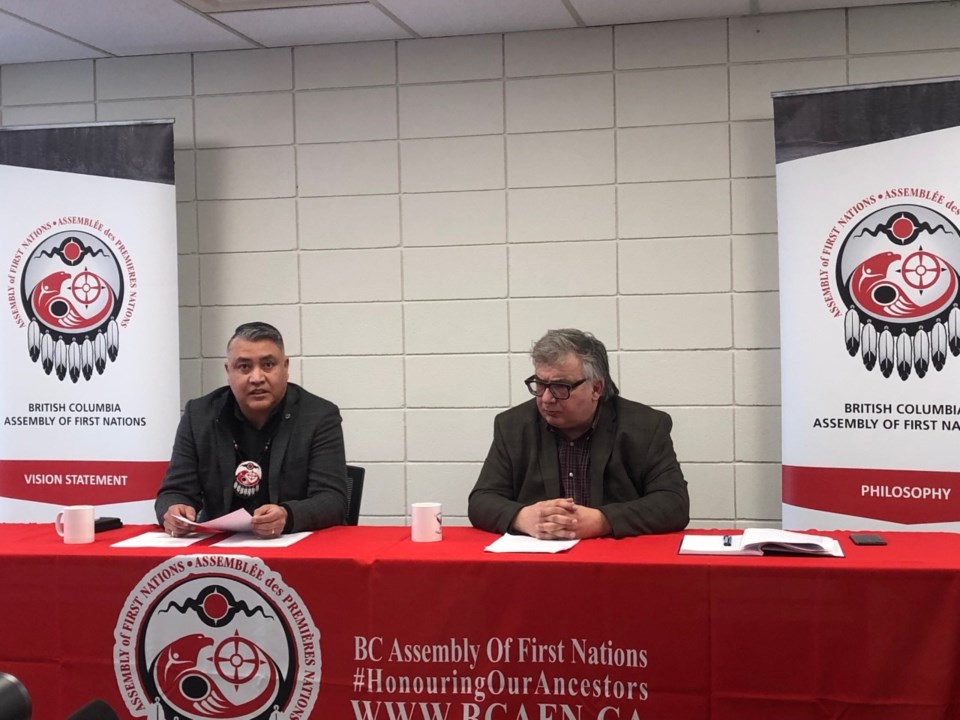The BC Assembly of First Nations (BCAFN) has released two reports which raise concerns regarding the enforcement of the City of Prince George’s Safe Streets Bylaw.
The reports conclude that the bylaw is endangering the lives of de-housed and precariously housed individuals in the city.
Both reports, one conducted by the BCAFN and the other by Prof. Joe Hermer, chair of the sociology department at the University of Toronto, conclude the use of informal tactics, such as verbal exchanges rather than formal tickets, fosters a systemic lack of accountability and transparency.
“The findings of these reports demonstrate a dire and unacceptable situation on the streets of Prince George,” stated Regional Chief Terry Teegee, adding that Prince George’s recent Point-in-Time homelessness report shows 70 per cent of de-housed people are Indigenous.
“To put it simply, this research has confirmed our assertions that the Safe Streets Bylaw would be harmful and discriminatory toward unhoused and housing insecure individuals, most of whom are First Nations. As we have expressed from the onset, this bylaw is counterproductive, cruel, and inherently racist.”
The city adopted the controversial bylaw on August 30, 2021, despite opposition from First Nations leadership and local service providers.
The bylaw enables bylaw officers to ticket for a number of “nuisance” behaviours like panhandling, using drugs, or lying down and obstructing a doorway.
However, while discussing his report titled: “Move On: The First Ninety-Nine Days of the City of Prince George Safe Streets Bylaw" Hermer noted that no tickets were issued during the time period that was studied.
He said the bylaw is instead being applied informally in a crude and punitive way that increases the suffering of unsheltered people.
Hermer carried out a preliminary examination of 427 ‘workflow’ files or bylaw enforcement events identified by city staff as resulting from the new bylaw.
“When responding to complaints bylaw enforcement almost without exception move people on,” said Hermer.
“Bylaw officers almost never made any attempt to connect people they were moving on to any type of social services, any type of assistance or any type of way they could access services or gain assistance.”
He said in a period of 99 days bylaw workers only called an outreach worker for assistance three times and bylaw officers referred to individuals as “squatters” in 36 per cent of the summaries of public complaints.
“Not issuing tickets is not a humanitarian gesture in the application of this bylaw. It is not a social care way to apply the law,” said Hermer.
“Informal regulation makes it invisible and unaccountable. There is no due process and no necessity of bylaw enforcement to have to establish that anything is illegal because there is no ticket being issued."
He concluded that the Safe Streets bylaw enforcement is punitive in how it is disconnected from the life-threatening circumstances of the overdose crisis, the pandemic, and the immediate lack of appropriate shelter, housing opportunities and medical assistance.
The BCAFN report titled, "Experiences with Bylaw in Prince George" comprises research documenting the experiences of de-housed and precariously housed residents under the Safe Streets Bylaw.
Between March 8-11, 2022, a team of six researchers (three Indigenous and three non-Indigenous) conducted 13 semi-structured interviews in bylaw “hotspots” to be recorded, transcribed, and analyzed.
Teegee said this research also showed there was no educational component to the bylaw.
“We also found there is no educational approach despite the city’s claims the bylaw was an educational tool. Seventy per cent of our respondents claimed they did not know what was prohibited under this bylaw and bylaw officers did not tell them where they could go for shelter or for services.”
The respondents said the bylaw causes Prince George’s streets, sidewalks, and alleys to be less safe for de-housed and precariously housed citizens and that the bylaw is leveraged to shield the housed public from visible poverty.
“I want to share a quote from one of the people who were interviewed from our report; ‘It makes me feel like I am less useful. Less important member of society. It makes me feel disposable, dispensable, worthless, unwanted, unwelcomed and unheard’,” added Teegee.
The report also concluded that women are more likely to be impacted and included an account of a woman who experienced a bylaw officer making continual sexual advances towards her.
“When bylaw is constantly moving people on where are they supposed to go? City council has stated it would be willing to evaluate the effectiveness of bylaw in advising,” added Teegee. “It is now clear that the bylaw is failing everyone in the city of Prince George and it is time to get rid of it.”
BCAFN said it maintains an urgent call for governments to support First Nations to address homelessness amongst both on and off-reserve with evidence-based and trauma-informed approaches.
“We consistently offer our assistance to the city in asking for help from the federal and provincial government, so I offer that assistance once again,” said Teegee. “It takes all levels of government to deal with the issue of homelessness and it’s not just the City of Prince George.”







